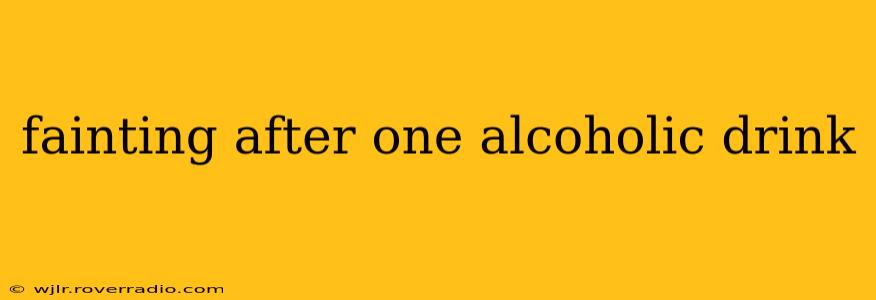Fainting, or syncope, after consuming just one alcoholic beverage can be alarming and requires careful consideration. While it's uncommon for a healthy individual to faint after a single drink, several factors can contribute to this reaction, making it crucial to understand the underlying causes and potential risks. This article will explore the various reasons why this might happen, emphasizing the importance of seeking medical attention if you experience this symptom.
Why Might I Faint After Only One Alcoholic Drink?
This isn't a typical reaction to alcohol, suggesting an underlying medical condition rather than simply alcohol intoxication. Several factors could be at play:
-
Underlying Cardiovascular Issues: Heart problems, such as arrhythmias (irregular heartbeats), bradycardia (slow heart rate), or structural heart defects, can significantly increase the risk of fainting. Alcohol can exacerbate these conditions, leading to fainting even after a small amount.
-
Dehydration: Alcohol is a diuretic, meaning it increases urination and can lead to dehydration. Dehydration lowers blood volume, reducing blood flow to the brain and increasing the likelihood of fainting, especially if combined with a pre-existing condition.
-
Low Blood Sugar (Hypoglycemia): Alcohol can interfere with the body's ability to regulate blood sugar. Individuals with diabetes or those prone to low blood sugar are at higher risk of experiencing a hypoglycemic episode after consuming alcohol, potentially leading to fainting.
-
Medication Interactions: Certain medications, when combined with alcohol, can increase the risk of fainting. These interactions can significantly impact blood pressure and heart rate. Always inform your doctor and pharmacist of all medications you are taking, including over-the-counter drugs and supplements.
-
Orthostatic Hypotension: This condition involves a sudden drop in blood pressure upon standing up. Alcohol can worsen orthostatic hypotension, making you more prone to fainting, especially after standing quickly after consuming a drink.
What Should I Do If I Faint After One Drink?
Seek immediate medical attention. Fainting after a single alcoholic drink is not a normal reaction and warrants a thorough medical evaluation. A doctor can perform tests to identify any underlying health issues contributing to this symptom. Delaying medical care could be dangerous.
Can Certain Medical Conditions Increase My Risk of Fainting After Alcohol Consumption?
Yes, several medical conditions significantly increase the likelihood of fainting after even one alcoholic beverage. These include:
-
Neurological disorders: Conditions affecting the nervous system can impact blood pressure regulation and increase the risk of fainting.
-
Gastrointestinal disorders: Certain gastrointestinal issues can affect nutrient absorption, impacting blood sugar levels and increasing the risk of fainting.
-
Endocrine disorders: Hormonal imbalances can influence blood pressure and blood sugar control, making one more susceptible to fainting after alcohol consumption.
How Can I Prevent Fainting After Drinking Alcohol?
If you have a history of fainting after consuming alcohol, it’s crucial to take preventative measures. These include:
-
Limiting or avoiding alcohol consumption: This is the most effective way to prevent alcohol-related fainting episodes.
-
Staying hydrated: Drink plenty of fluids throughout the day, especially if you plan to consume alcohol.
-
Eating before drinking: Consuming a meal before drinking can help slow the absorption of alcohol into the bloodstream.
-
Standing up slowly: Avoid sudden changes in position to minimize the risk of orthostatic hypotension.
Is It Always Serious to Faint After One Alcoholic Drink?
While not always indicative of a severe condition, fainting after one drink should never be dismissed. It's a crucial warning sign that requires immediate medical attention to rule out underlying health issues.
Disclaimer: This information is for educational purposes only and should not be considered medical advice. Always consult a healthcare professional for diagnosis and treatment of any medical condition.
